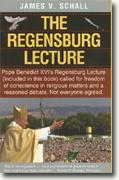The Regensburg Lecture
James V. Schall
book reviews:
· general fiction
· chick lit/romance
· sci-fi/fantasy
· graphic novels
· nonfiction
· audio books
· author interviews
· children's books @
curledupkids.com
· DVD reviews @
curledupdvd.com
newsletter
win books
buy online
links
home
for authors
& publishers
for reviewers

 |
The Regensburg Lecture James V. Schall St. Augustine's Press Hardcover 176 pages April 2007 |
|
In September 2006, Pope Benedict XVI visited his home country of Germany. One of the places he visited was Regensburg University, where he presented a lecture - a typical thing for a professor to do in a university setting. Pope Benedict was a professor of theology before becoming an Archbishop. Though he had hoped to retire and continue his writings on theology and other issues, God had other plans for him.
Fr. James V. Schall, S.J., discusses the Regensburg Lecture from an academic point of view; general readers may have a hard time reading this book. Schall includes the lecture itself as an appendix, but it should be read before reading his discussion and commentary. He points out that the Pope says that universities are important as places of dialogue and education, and that they should be free places to dialogue without fear of being murdered or put into jail. Schall’s second chapter concerns the issue of violence and God, particularly Islam and violence. Is it reasonable or rational for violence to be committed in the name of God? The Pope asks moderate Muslims to speak out against violence if Islam is really a religion of peace. He also asks if it is reasonable that innocents are killed by terrorists who say they act in the name of God or their religion. From a Christian point of view, it is not. From a rational point of view, these murders are not reasonable. The third chapter contains a discussion on Europe and its Christian roots. Secularism and Islam are contrary to European culture; secularism is allowing Europe’s Christian culture to be replaced by cultures alien to Europe. The people from these cultures seem not to be willing to assimilate into European culture, declaring it as depraved. In many ways, it is because of secularism opposing Christianity. In chapter four, Schall discusses the “dehelenization” of Europe as Europe and the West turn their backs on the Greek tradition of reason and truth used as a basis for St. Thomas Aquinas’ philosophy and that of others. In chapter five, Fr. Schall discusses revelation and culture. Some deny that reason exists, insisting that religion has nothing to offer to humanity. The pope and others refute this claim. Culture needs reason or rationality to survive and to progress, and the pope argues for the place of theology alongside science and philosophy in the university. To remove theology or religion from the university or the greater culture removes an important part, if not the most important part, of Western civilization. In his conclusion Fr. Schall’s one statement is very important: “No single idea is more dangerous to our kind than the idea that God approves of violence in his name. To claim to do violence, that is, to take the lives of the innocent, in the name of God is precisely blasphemy.” He says this violence is irrational and beyond reason. The second appendix is an article entitled, “On the term ‘Islamo-Fascism’.” This term has appeared in other books and articles, referring to radical Muslims and some Muslim governments like Iran. Terrorist groups like Hamas, Hezbollah, and Al-Qaeda have been so named, too - they are accused of being similar to the Nazis. Fr. James V. Schall, S.J., is a professor of government at Georgetown University. He is the author of the forthcoming book Order of Things (Oct. 2007), Sum Total of Human Happiness (2006), The Life of the Mind (2006), Roman Catholic Political Philosophy (2004), and many other books and articles. He is also involved with the new edition of The Collected Works of G.K. Chesterton being published by Ignatius Press. This book is highly recommended to those interested in the discussion on Islam and the West, reason and non-reason, Christianity and secularism, the Pope’s lecture at Regensburg, and Christianity and philosophy. It will likely prove a difficult book for general readers because parts of it are complicated and academic in tone. It is not a book to hurriedly read; it needs time and thought - and one may say prayer, too. Originally published on Curled Up With A Good Book at www.curledup.com. © Br. Benet Exton, O.S.B., 2007 |
|
|
|
 Click here to learn more about this month's sponsor! |
|
| fiction · sf/f · comic books · nonfiction · audio newsletter · free book contest · buy books online review index · links · · authors & publishers reviewers |
|
| site by ELBO Computing Resources, Inc. | |
 In his lecture, Pope Benedict asked whether religion, particularly Islam, and reason can have a dialogue. He quoted a Byzantine emperor, Manuel II, who caused a lot of problems and some murders or martyrdoms. After the presentation, Muslim radicals felt that the Pope had insulted their religion; many protests and violence occurred. The Pope had asked a simple question - whether Islam is based on reason or not, and could there be a peaceful dialogue or not. The violent protests showed that among some Muslims, this is not possible.
In his lecture, Pope Benedict asked whether religion, particularly Islam, and reason can have a dialogue. He quoted a Byzantine emperor, Manuel II, who caused a lot of problems and some murders or martyrdoms. After the presentation, Muslim radicals felt that the Pope had insulted their religion; many protests and violence occurred. The Pope had asked a simple question - whether Islam is based on reason or not, and could there be a peaceful dialogue or not. The violent protests showed that among some Muslims, this is not possible.